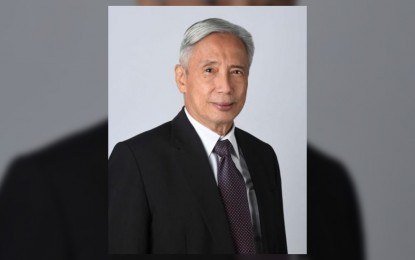
RATE HIKE. Monetary authorities hike further the Bangko Sentral ng Pilipinas' (BSP) key rates on Thursday (Aug. 18, 2022) given the continued acceleration of domestic inflation rate. BSP Governor Felipe Medalla cited the need to ensure price stability vis-a-vis the rise in the rate of price increases. (Photo courtesy of BSP)
MANILA – Monetary authorities hiked Thursday the Bangko Sentral ng Pilipinas’ (BSP) key rates by 50 basis points as they cited the need to continue implementing measures to address the elevated inflation rate.
This brought the central bank’s overnight reverse repurchase (RRP) rate to 3.75 percent and the overnight repurchase (RP) rate to 4.25 percent effective Aug. 19, 2022.
In a virtual briefing, BSP Governor Felipe Medalla said the latest average inflation forecast for this year has been hiked to 5.4 percent, while the 2023 and 2024 figures were slashed to 4 percent and 3.2 percent, respectively.
These were previously at 5 percent, 4.2 percent, and 3.3 percent for 2022-2024, respectively.
The BSP’s average inflation forecast for this year is higher than the government’s 2 to 4 percent target band until 2024 while the projections for the next two years are within-target.
“The inflation target remains at risk over the policy horizon owing to broadening price pressures,” Medalla said, noting that “elevated inflation expectations likewise highlight the risk of further second round effects.”
He said risks to the inflation outlook remain on the upside “due to the potential impact of higher global non-oil prices, the continued shortage in domestic fish supply, the sharp increase in the price of sugar, as well as pending petitions for transport fare increases.”
However, Medalla said “impact of a weaker-than-expected global economic recovery as well as the resurgence of local Covid-19 (coronavirus disease 2019) infections continue to be the main downside risks to the outlook.”
“For these reasons, the Monetary Board deemed further monetary action to be necessary to anchor inflation expectations and avoid a further breach in the inflation target over the policy horizon. The favorable growth outcome in the first half of the year also gives the BSP the flexibility to act against inflation pressures while allowing domestic demand to sustain its recovery momentum amid prevailing headwinds,” he added.
The latest rate hike brought to 175 basis points the increase in the central bank’s key policy rates so far this year.
This, as inflation further accelerated last July to 6.4 percent year-on-year, the fastest since October 2018.
Medalla said inflation is forecast to peak either in October or November this year.
“It’s really only in the second half of next year that we expect that the headline inflation will be closer to 3 percent than to 4 (percent),” he said, but added this still depends on several factors, such as the changes in oil prices in the international market and the key rate adjustments of the Federal Reserve.
Also, with the economy posting slower growth in the second quarter of this year at 7.4 percent from quarter-ago’s 8.2 percent, Medalla said future monetary policy decisions remain data-dependent, citing as major considerations the Fed rate adjustments and the movement in foreign exchange.
He said the recovery of the domestic economy remains “robust enough to absorb further tightening as necessary.”
Medalla said any adjustments in the BSP’s key rates will have an impact on domestic output but with the central bank’s price stability mandate, monetary authorities will favor price stability over the expansion of the domestic economy.
“Achieving a target-consistent path of inflation is of great importance to us. And our view is that respectable growth is still possible under those terms. Whether that respectable growth is lower or within the DBCC (Development Budget Coordination Committee) target of 6.5 to 7.5 percent is of course important to us but at the same time, to us, price stability is the primary concern,” he added. (PNA)
